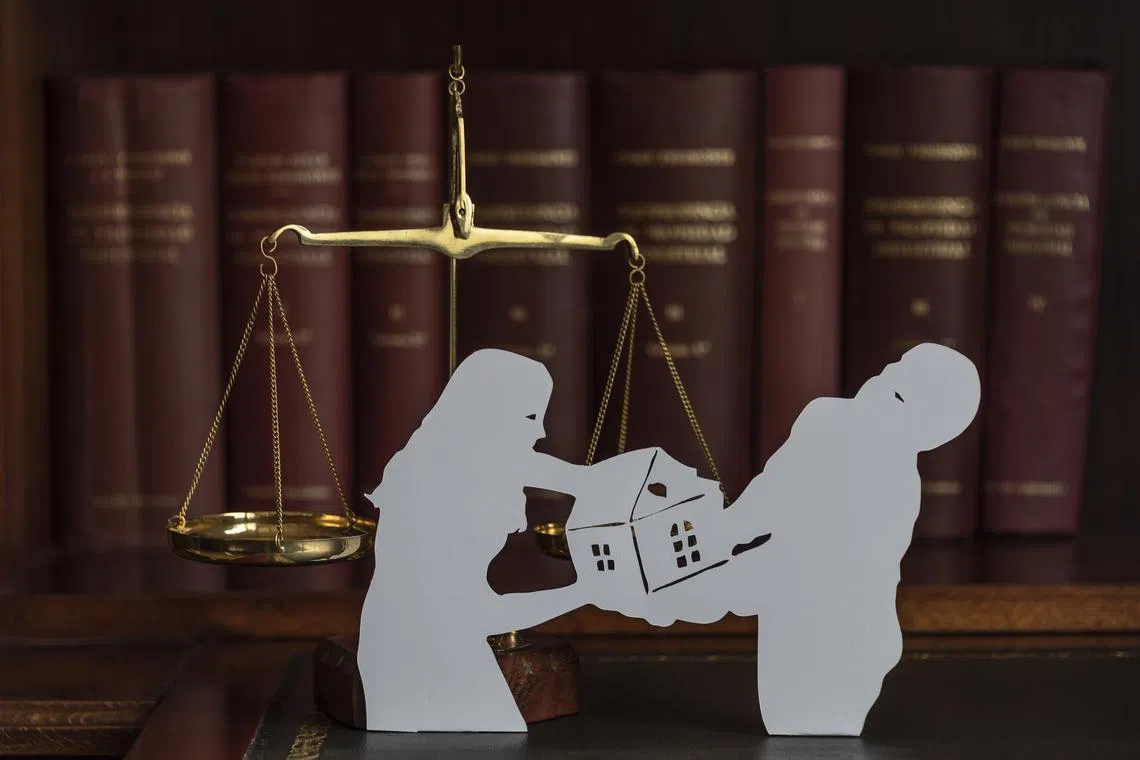Couple agreed 50% of flat’s value to be split upon divorce, but judge says it should be 100%
Sign up now: Get ST's newsletters delivered to your inbox

The flat was bought under joint tenancy, which means all the co-owners have an equal share in the property.
PHOTO: ISTOCKPHOTO
Follow topic:
Singapore – A man lost his appeal that only 50 per cent of a three-room flat owned by him and his mother before she died should be included in the pool of matrimonial assets to be divided upon his divorce.
Even though splitting 50 per cent of the flat’s value was what he and his former wife had agreed on, a district judge earlier ruled that 100 per cent of the flat’s value should be counted in the pool of marital assets to be divided.
The husband appealed the decision.
The man and his mother bought the flat seven years before his marriage in 1989, and he became its sole owner after she died in 2022.
In a judgment on his appeal which was released on Dec 27, 2023, High Court Senior Judge Andrew Ang said that the flat is the couple’s matrimonial home where they lived and raised their only child. As it was their matrimonial home, he ruled that the entire value of the flat would be counted in the pool of marital assets to be split between them.
Justice Ang said that the couple’s agreement is but one factor in the overall assessment, adding that “it remains critical for the court to consider all the circumstances of the case when determining the proper weight to be given to such an agreement”.
The judge also rejected the man’s argument that the 50 per cent share of the flat he inherited after his mum’s death should be excluded from the marital pool, as it was an inheritance.
While a section of the Women’s Charter that defines matrimonial assets provides an exception for assets that are inherited, this exception does not apply if the inherited asset is considered a matrimonial home, Justice Ang said.
The couple’s flat is considered their matrimonial home, and hence, their matrimonial asset, the judge said.
The couple lived in the flat through their union, which lasted about 30 years even though they led separate lives for the bulk of that time, and raised their daughter there.
The property at the heart of the case is a three-room flat in Chai Chee that the man and his mother bought in 1982 for $40,500.
The flat was bought under joint tenancy, which means all the co-owners have an equal share in the property, regardless of the individual’s contribution to the purchase.
In 1989, the man tied the knot and the newly-weds, together with the man’s mother, moved to live in the flat. The couple’s names, ages and occupations were not stated in the judgment.
A year after their daughter was born in 1993, the marriage fell apart.
Justice Ang wrote: “Parties (referring to the couple) took to sleeping in different rooms owing to constant arguments and ceased all physical and emotional intimacy and development.”
He added that the pair kept communication to a minimum, such as when it was necessary and regarding matters pertaining to their daughter’s care, education and health.
In 2019, they filed for divorce.
The couple had agreed that the husband and his mother each owned 50 per cent of the flat, which was fully paid up and worth $305,000 at that time.
And they agreed that only the husband’s share of the flat, or 50 per cent, would be counted in the matrimonial pool of assets to be divided.
Justice Ang said the man’s argument that the flat was bought before the marriage is “irrelevant” once the flat became the matrimonial home.
“Indeed, matrimonial homes are subject to the court’s power of division upon dissolution of the marriage, even if they were acquired before the marriage,” he added.
The judge said the couple had not thought about what would happen should the man inherit his mother’s share of the flat if she died after they had reached an agreement.
The couple had decided to split only the man’s share of the flat, as they arrived at an agreement before his mother died.
Justice Ang said: “To therefore visit upon the wife the consequence that she is entitled to share in only 50 per cent of the matrimonial flat notwithstanding the fact that the husband has since become entitled to 100 per cent of the property by way of survivorship would, in my view, not be just and equitable.”
Mr Lim Chong Boon, head of family law and litigation at PKWA Law Practice, explained that matrimonial assets encompass all the properties acquired during the course of a marriage.
Typically, properties that are obtained before the marriage are not considered a marital asset, unless they are regularly used by the family, among other criteria.
Likewise, assets that are inherited are not automatically classified as matrimonial assets, but there is an exception to this inheritance rule if an asset is used as a matrimonial home.
The law makes it very clear that any property that is inherited will be considered a matrimonial asset if it was used as a matrimonial home, Mr Lim said.
Ms June Lim, a director at Focus Law Asia, said that the type of ownership of a property does not impact the court’s power to divide the property in a divorce.
A person may have bought a flat before marriage in his or her sole name, or with another person like his or her parents, but the status of the flat as a matrimonial home makes 100 per cent of its value subject to division under the Women’s Charter.
PKWA’s Mr Lim noted that a private agreement, as in this case, on the division of marital assets is highly persuasive, but it is not binding and the courts have the final say.
He said that to ensure that an agreement, whether it is a pre-nuptial or post-nuptial agreement, made by the couple becomes ironclad and binding, it has to be turned into a consent court order.
Lawyers typically submit draft consent orders for the court to approve and issue.
He said: “The consent court order becomes binding on both parties, and it becomes extremely difficult to change it.”


